AiW Guests: Jess Irving and Jessica Smith
Angela Wachuka is one of Kenya’s leading literary producers. In 2018, with Wanjiru Koinange, she founded Book Bunk. From 2008 to 2017, Wachuka was Executive Director of Kwani Trust, where she published Africa’s leading literary voices including Binyavanga Wainaina, Nuruddin Farah, Yvonne Adhiambo Owuor and Ayobami Adebayo. She is also a founding member of the Creative Economy Working Group.
Wachuka’s main interests are in the intersection between media, popular culture and the creative industries. These are foregrounded in her work with Book Bunk, a project which is focused on restoring public libraries in Kenya into spaces of shared community and knowledge production. Book Bunk are currently working towards the complete restoration of three libraries in Nairobi: McMillan Memorial Library and two of its branches- Kaloleni Library and Makadara Library.
We had the chance to speak with Wachuka last month via video conference, across our workspace in Exeter and hers in Nairobi. We spoke about the evolution of Book Bunk from its initial formation to plans for the future are. As well as discussing the trials and tribulations that come with taking on a project of this magnitude, getting outside expertise and decolonising knowledge production..
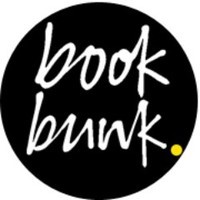
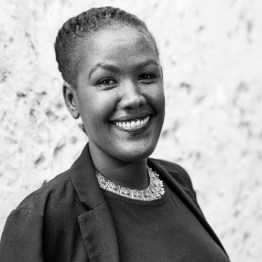
Angela Wachuka

Jess Irving & Jessica Smith for AiW: What were the drivers behind setting up Book Bunk, and how did this come about as a collaborative project?
Angela Wachuka: It actually started based on other work that Wanjiru and I were doing together. We were both working with Kwani Trust, and Wanjiru used to produce our literary festivals. During one of these editions (either the 2010 or 2012 edition), we were keen on using public spaces and so we visited the McMillan Library to see if it could be a possible venue. We were shocked by what we found – the condition of the building and the collections themselves. We then got into a longish conversation about the state of that library and why things were the way that they were. We then began to do really small interventions with it – basically sending book donations their way. Over quite a short period, we realised that the work that was needed was much larger. The books donated to the libraries could only act as reference books because the library didn’t have a system that allowed users to check-in and check books out.
Some time later, Wanjiru was commissioned to write a non-fiction piece for Commonwealth Writers. We knew the McMillan Library had a deeply colonial legacy. We had all these questions we were curious about, but we just couldn’t find enough in public records. So Wanjiru chose to focus her piece on researching all these questions. When the piece was published on the Commonwealth Writers website, it really became the foundation from which we based our work.
After that, we grew up pretty quickly as Wanjiru had found out that the library was under the complete remit of Nairobi City County government. So, we went to visit the authorities that were involved in the running of the library and it was quite clear that we would need an entity in place in order to get into partnership with them. So, we began the work of registering our Charitable Trust and found board members. It took about two years to get registered and to negotiate what we had in mind. When the paperwork came through it was quite clear that we had something quite substantial. That’s kind of how things began really. Then, the next year, we started to work on it and then I left my job at Kwani Trust.
Coming together as writer and literary producer, how has your previous work in creative writing and the creative industries shaped this new project?
I think it actually forms the entire foundation for it. Without the kind of work that I was involved in over the last decade, and the same for Wanjiru as well, I don’t think we would have seen the opportunities that were possible here or that we would have seen the gaps that were there for the filling. I had begun thinking quite a lot about policy and all the policy gaps that we experience in the creative industries in Kenya. I started to get involved in the Creative Economy Working Group. This has been a critical intervention for thinking about creative sector policies and how to look out for them. Through that work, it became clear very quickly that there could be better security of livelihoods when it comes to the industry and that there could be better protection of heritage sites. And the links between understanding what actual heritage is and its possibilities when it comes to job provision. Making all these connections very much shaped our ideas for this new project.
You’ve spoken about wanting libraries to be spaces for “shared experiences”, how are you seeing this being played out and how do you imagine the libraries that you are working with becoming spaces for “shared experiences”?
I think a really critical angle that we are using is public programming. So, we had a series of events last year for the first time (21 in total). We received a grant from the British Council and sent a call-out which then resulted in artists applying for mini-grants that they would then use to run their own events. And this worked well for us because running public events is not our core business; it’s not necessarily a thing that we want to exhaust ourselves doing because we have the bigger work of restoring the libraries to focus on. Programming and the public aspect of it have been a really good way of bringing people back to the libraries and also beginning to challenge what these spaces are for. It’s traditionally understood that these are spaces of silence, not spaces to work collaboratively. Programming is a fundamental vehicle in getting people back into these spaces. Another aspect which has been fascinating for us is public participation. We’ve done a lot of work on understanding who current readers are through surveys, and then thinking through that demographic data. But also, we have used this to look into what the desired improvements are. To be honest this has made our work a lot more focused and driven by Nairobi residents. Through a large dataset, we can then understand what it is that users want to see in their spaces.
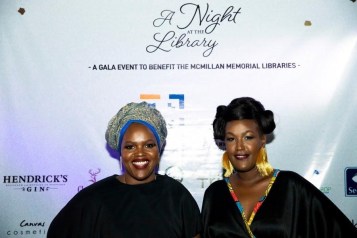
Angela Wachuka and Wanjiru Koinange at Book Bunk’s annual fundraising gala, ‘A Night at the Library’
We noted from your Facebook page that you held an event called ‘A Night at The Library’. What were your aims behind this specifically and how successful was it?
This is an event that we’ve hosted twice. We hosted one in 2018 which was designed as public outreach and to share our vision for the library. We reached out to tons of people in the creative sector and other industries, to invite them to come and spend an evening at the library. The whole point was to come and reimagine what was possible with us. For that particular evening, we commissioned a storytelling group for a series called ‘Too Early For Birds’. They take stories from the past and reimagine them in different settings. They dug into the history of the library itself and dramatised the history of the building and some of the key people involved in it.
Last year we hosted ‘A Night at The Library’ as our annual fundraising gala. We had 150 slots and sold out for the evening, bringing together sponsors and other supporters ranging from individual donors to corporate partners to foundations. This was to garner support for the three elements of our work; First, programming and events. Second, working on research and inventory and finally, the architectural restoration of the building, which is the most expensive.
Touching on what you have said about receiving sponsorship and the amazing support that you received following ‘A Night at the Library’, how have you funded this project more generally?
Our funding model depends on three sources. The first is grants from foundations whose concern might be the preservation of heritage spaces, education, programming, or other aspects of our work – the traditional model of support to cultural organisations. The second source is corporations. We get into partnerships with corporations who either have some creative programmes or are looking to get involved a lot more deeply in their immediate environment and are looking to make an impact in the areas we are working on. Our third source is individual givers.
In the ‘About Us’ video on your website, Jackie Karuti comments on the lack of books from African authors in the existing collection and notes that a vast majority of books are by white men. How have you tackled this in order to centre African literature in this project?
That’s a great question and is really at the heart of what we’re looking to do. One of the first things that we noticed about the collection is the fact that it doesn’t centre Africans or their experiences. And so, we have now compiled a list of titles for children, mostly by African authors, that givers can select from.
On our YouTube channel, we have a video called ‘Documenting Collections’. For the last year, since April, we have worked with a core team of six, who are our inventory interns. They have spent most of last year cataloguing the books at the libraries and we ended up with just over 95,000. This helped us to get an idea of what actually exists in the libraries and also guides our reading process because we have a very clear idea now of the material that is problematic. We have a clear idea of when the books arrived in the libraries and when they last left. Using the library’s first-ever digital catalogue that this team created, we are really able to form a clear picture of what exists, what we need to preserve and what we need to get rid of. And also, what needs to stay behind because of how problematic it is. What our team is doing now is weeding. We have a 3-stage process where we label everything either 1, 2 or 3. And basically, 3 means everything that we will revisit because the team has identified that the material should be taken out of the library. Either its physical condition is something we should look at or the content of it is something we should discuss. They are doing this process now and it should take 3 months. After that, one of the things we will be working on is the digitization of some of the collections.
After the renovation of the McMillan Memorial Library and its two branches in Kaloleni and Makadara, do you have any plans to expand and renovate other libraries in Nairobi and Kenya more broadly? Could you see Book Bunk moving outside of Kenya or is it very rooted in an idea of the Kenyan collective imaginary?
We think that there are intersections between so many things on this project and so we are keeping our options open to what is possible in the future. The important thing for us is that these three locations can demonstrate that this level of restoration and public participation is possible. The third thing is that it is perhaps replicable. We are immediately interested in social halls. A bunch of these are spread across the city and would be our immediate go-to, as they already exist. There is a lot of potential for making these multi-faceted: a combination of co-working, recreational spaces. A key output that we’re also working on is what we’re calling a ‘blueprint’ of our experience. It is important to us that other people who are thinking of restoring other public spaces can draw from our experience, where useful.
So, a key aspect of expanding your work is around models for restoring cultural heritage spaces?
Yes, absolutely. Also, in spaces not just in Kenya but other places in Africa. There is a chronic underfunding of these spaces that would benefit from more partnership models.
We noticed that you have a partnership with Glasgow Women’s Library which was launched in June 2019. How is this working and what do you think are the benefits of collaborations of this kind?
They are one of the most fantastic groups that we have met in recent years. They are so generous and have gone through so many similar experiences to us in terms of trying to restore a building and updating collections. Through this, they possess a world of expertise. We felt very strongly about not wanting to reinvent the wheel around archiving and the archiving process and restoring collections, so our partnership is superb to have!
The way that this partnership came about was through the British Council’s Cultural Heritage for Inclusive Growth programme, pairing the two entities at a critical time, when we were just beginning to map out the archiving process. Our ethos and social philosophies are very connected to each other, so we chose to work with them. This has meant a quick rapid-fire of exchanges every month around key things. We collaborated with them last year and we now call them our ‘critical friends’! Last year Wanjiru and I had the opportunity to visit them and other spaces in Edinburgh and Glasgow with significant archives. Our Research and Inventory Manager then spent a week with them in February, learning a lot more about preservation, ahead of us getting ready to digitise really sensitive material, sometimes in poor physical condition. The oldest newspapers we have found date back to 1906, and the Glasgow Women’s Library have taught us a bunch including information to include in archiving metadata and suitable storage material for old papers! It’s been thoroughly satisfying working with them – we’ve squeezed, into a year, a lifetime of learning, especially concerning archiving.
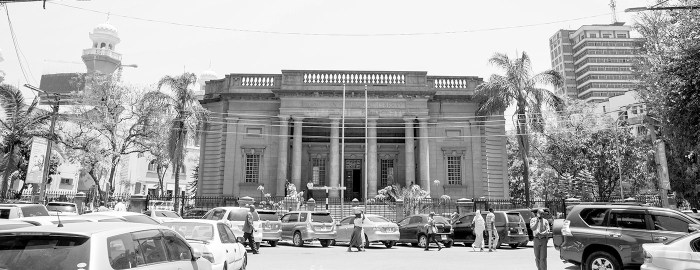
The McMillan Memorial Library, Nairobi. Photo: Book Bunk
How do you collaborate with other organisations in Kenya in the literary space?
A lot of it is to do with programming, to be honest, such as providing physical space for people in the literary sector. Given both of our backgrounds and our focus, literary production is very important to us and so is the provision of space. We also collaborate quite a lot on providing employment for people in the literary sectors, so storytellers and writers. We also deeply believe in promoting relative livelihoods. So, for instance, when we have support to get content or books, we’re committed to spending that money on our local content producers. That’s something that we feel strongly about.
In the future, how do you plan to bring new audiences to the libraries you are working with?
We want to work with publishers as much as possible. We don’t necessarily think that we need to handle all of the programming, for instance, to do with the library, and it is through collaborations with the artistic community that we think we can work to bring a diverse group of people into the library. So, if you’re working with an 18-year old who is looking at digital media, that’s very different from people who are coming to listen to storytelling sessions and they’re different from a project focused on senior citizens. So, collaboration is key for us in terms of tapping into different audiences.
Are you currently working on any independent projects or is it just Book Bunk, and if so, how do you juggle your independent work with project managing Book Bunk?
I have actually narrowed down to focus on this work because it’s so clear to Wanjiru and I that it is something you do need to do full-time. There isn’t room to be as part-time with it as before. Everything else I do now stems from this work, including continuing work with the Creative Economy Working Group.
Even though Wanjiru was unable to join us today, do you know if she is working on any independent projects or is she like you, making Book Bunk her prime focus?
It’s a prime focus for her too, but for some reason, she seems to have much more time than I do – I don’t think our 24 hours are the same!
One of the most exciting things that she has done recently is to complete a novel. Her debut novel is called The Havoc of Choice, which is being released in Kenya and the UK. At the moment she is working on a travelogue under the Outriders Africa banner, supported by the Edinburgh Book Festival. So, she does have a lot of writing projects as well as producing other independent arts projects. She has also been producing podcasts – with Book Bunk’s coming soon!
So, what is next for Book Bunk? What are the big things you’ll be working on across 2020?
We are excited about a new podcast series we are producing, focusing on this process but also on objects that we’re finding or experiences that we’re coming across. This includes portraits of soldiers in the King’s African Rifles, who returned from fighting in Burma. These objects are informing our interrogation of culture and history, and we are excited about multimedia possibilities in general.
We have also started a tiny publishing house within Book Bunk, and we’ll be releasing Wanjiru’s novel, The Havoc of Choice, in Kenya through that independently, as well as a children’s book in different African languages.
We’re also doing our first physical restoration; the Kaloleni branch will be restored into a children’s library. We are actively fundraising for the restoration of the Eastlands branch into a hub for young people, so there is a lot of energy going into that. Lots of energy going into the digitisation of content and the selection of material centering African knowledge production. So, lots going on that is exciting for sure!

 Jessica Smith is an undergraduate studying English at the University of Exeter. Her final year of study has primarily focused on World Literatures and Publishing. In her current research, she is exploring imaginings of national identity in the cultural production following the Grenfell Tower Fire. She is an advocate for social mobility in the South West of England following her recent work with the educational charity, CoachBright.
Jessica Smith is an undergraduate studying English at the University of Exeter. Her final year of study has primarily focused on World Literatures and Publishing. In her current research, she is exploring imaginings of national identity in the cultural production following the Grenfell Tower Fire. She is an advocate for social mobility in the South West of England following her recent work with the educational charity, CoachBright.
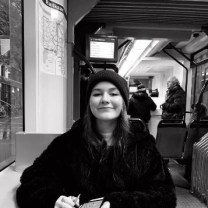
Jess Irving is a third-year student studying English at the University of Exeter. Her areas of interest include Postcolonial literature, American modernism and literary theory. She has previously written for the university newspaper, Exepose, and is planning to continue her studies by studying English Literary Studies at postgraduate level at the University of Exeter after graduating from her undergraduate degree.
Categories: Conversations with - interview, dialogue, Q&A
 Q&A: Koleka Putuma -Revolutionising the archive and (backspace) dancing… ‘Hullo, Bu-Bye, Koko, Come in’
Q&A: Koleka Putuma -Revolutionising the archive and (backspace) dancing… ‘Hullo, Bu-Bye, Koko, Come in’  Words on…Past & Present: The International Black Speculative Writing Festival (London & Remote)
Words on…Past & Present: The International Black Speculative Writing Festival (London & Remote)  Q&A: Publishing roundtable – #ReadingAfricaWeek
Q&A: Publishing roundtable – #ReadingAfricaWeek  Q&A: Words on… e-Kitabu – the Rights Café, Nairobi International Book Fair
Q&A: Words on… e-Kitabu – the Rights Café, Nairobi International Book Fair
join the discussion: